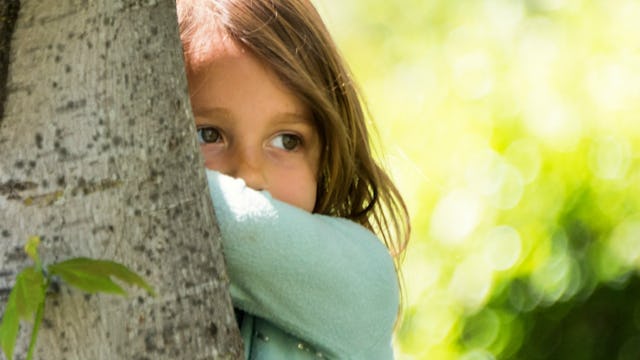This Is What We Need To Remember About Shy Kids

My middle child is not a talker like her older and younger brothers are. When she was little, I actually took her to the doctor because I was a concerned her lack of vocabulary was abnormal. She would say a few words, but that was it. She had no problem nodding her head, hiding behind my legs at the grocery store, and not saying anything else.
When she would play at home with her siblings whom she was very comfortable with, she often got her point across in ways other than talking, or was content sitting back and watching. It wasn’t unusual for her to get up and leave to decompress if things got too wild either. She knew her limits and was comfortable sticking to them — she always has been and I hope she always will be. I love that about her.
When she went to kindergarten, and I saw her interact with teachers and students, it was then that I realized I had a shy child and I needed to let her be who she is. Because I am a talker, and my other two boys hardly let her get a word in edge wise, I always wondered if she just felt like she didn’t have a chance to talk. I would try to simmer them down in hopes of opening her up. But the thing is, she was content just the way things were. She didn’t need any help or prompting from me. And truth be told, I’m relieved she didn’t need her brothers to be quiet in order to feel like she was being heard because that was pretty damn exhausting for all of us.
Now as a teenager, her shyness can come across as snobby or rude even more than it did when she was younger. It’s hard for her to look a stranger in the eye. She does not run up to family members and give them a big hug, and if she’s criticized for her shyness in any way, she shuts down even more.
But we have to remember our shy kids are not rude; they want to break out of their comfort zone and try new things too. They would like nothing more than to have the courage to walk up to someone and ask them if they want to play. But sometimes they can’t, and that’s okay. They might not make eye contact or say hello to you, but it’s not out of spite. Really, it’s not about you at all.
My shy child is exactly who she wants to be, and I make zero apologies for her. If I did that, she would think she had to say sorry just for being herself. And she doesn’t.
She is not talkative like me or her outgoing brothers; she is her own beautiful, unique person. Her shyness is not a character flaw. It does not mean she doesn’t want friends or to feel included. It just takes her a lot longer to warm up to friends and new ideas, and she’s not likely to participate in class because it makes her nervous to be the center of attention.
Despite all this, she has pushed herself to move outside her comfort zone. She plays sports and joined chorus. At times, all eyes are on her. I can tell by her body language it’s not easy for her to get through this — it’s so much more comfortable to stay in a box. It’s incredibly hard for them to get over their fear of rejection, and they spend lots of time thinking about talking to someone in public, or approaching someone even if they know them.
They don’t need to be pushed or persuaded to talk to or touch people. If they aren’t doing it on their own, it means they don’t want to. In fact, their ability to stick to their own boundaries and find safety when necessary is a strength, not a weakness.
So instead of thinking shy kids are rude, don’t have manners, or are just being difficult, they need to be respected just as everyone wants to be respected for their personality traits. They need to feel secure in who they are. It’s easy to spot a shy person, and giving them that space to open up in their own pays off.
Because once you befriend a shy person, they will be a friend for life. And when they open up and feel like they can be themselves, you will know they are comfortable enough with you to let their guard down. It’s an incredible gift and should be treated as such.
This article was originally published on